江苏省苏州市2019届高三上学期期末考试 英语 Word版含答案
精选高三英语上学期期末考试试题(1)(1)
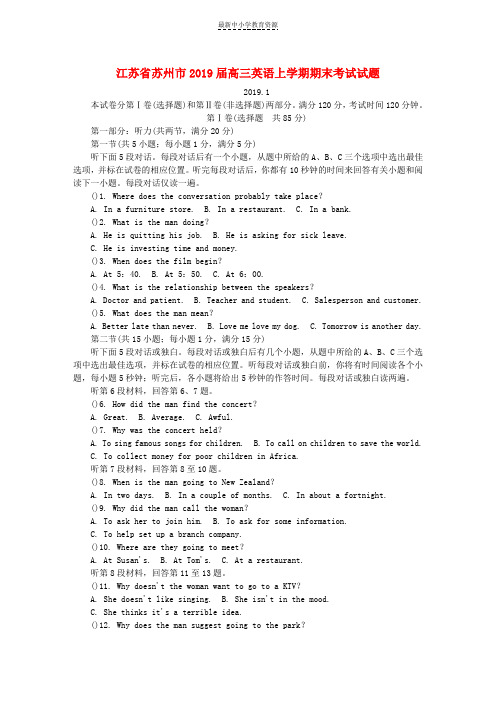
江苏省苏州市2019届高三英语上学期期末考试试题2019.1本试卷分第Ⅰ卷(选择题)和第Ⅱ卷(非选择题)两部分。
满分120分,考试时间120分钟。
第Ⅰ卷(选择题共85分)第一部分:听力(共两节,满分20分)第一节(共5小题;每小题1分,满分5分)听下面5段对话。
每段对话后有一个小题,从题中所给的A、B、C三个选项中选出最佳选项,并标在试卷的相应位置。
听完每段对话后,你都有10秒钟的时间来回答有关小题和阅读下一小题。
每段对话仅读一遍。
()1. Where does the conversation probably take place?A. In a furniture store.B. In a restaurant.C. In a bank.()2. What is the man doing?A. He is quitting his job.B. He is asking for sick leave.C. He is investing time and money.()3. When does the film begin?A. At 5:40.B. At 5:50.C. At 6:00.()4. What is the relationship between the speakers?A. Doctor and patient.B. Teacher and student.C. Salesperson and customer.()5. What does the man mean?A. Better late than never.B. Love me love my dog.C. Tomorrow is another day.第二节(共15小题;每小题1分,满分15分)听下面5段对话或独白。
每段对话或独白后有几个小题,从题中所给的A、B、C三个选项中选出最佳选项,并标在试卷的相应位置。
江苏省苏州市2019届高三上学期期末考试英语Word版含答案

2019届高三模拟考试试卷英语2019.1第一节(共5小题;每小题1分,满分5分)听下面5段对话。
每段对话后有一个小题,从题中所给的A、B、C三个选项中选出最佳选项,并标在试卷的相应位置。
听完每段对话后,你都有10秒钟的时间来回答有关小题和阅读下一小题。
每段对话仅读一遍。
()1. Where does the conversation probably take place?A. In a furniture store.B. In a restaurant.C. In a bank.()2. What is the man doing?A. He is quitting his job.B. He is asking for sick leave.C. He is investing time and money.()3. When does the film begin?A. At 5:40.B. At 5:50.C. At 6:00.()4. What is the relationship between the speakers?A. Doctor and patient.B. Teacher and student.C. Salesperson and customer.()5. What does the man mean?A. Better late than never.B. Love me love my dog.C. Tomorrow is another day.第二节(共15小题;每小题1分,满分15分)听下面5段对话或独白。
每段对话或独白后有几个小题,从题中所给的A、B、C三个选项中选出最佳选项,并标在试卷的相应位置。
听每段对话或独白前,你将有时间阅读各个小题,每小题5秒钟;听完后,各小题将给出5秒钟的作答时间。
每段对话或独白读两遍。
听第6段材料,回答第6、7题。
()6. How did the man find the concert?A. Great.B. Average.C. Awful.()7. Why was the concert held?A. To sing famous songs for children.B. To call on children to save the world.C. To collect money for poor children in Africa.听第7段材料,回答第8至10题。
江苏省苏州市2019届高三上学期期末考试 英语

2019届高三模拟考试试卷英语2019.1 本试卷分第Ⅰ卷(选择题)和第Ⅱ卷(非选择题)两部分。
满分120分,考试时间120分钟。
第Ⅰ卷(选择题共85分)第一部分:听力(共两节,满分20分)第一节(共5小题;每小题1分,满分5分)听下面5段对话。
每段对话后有一个小题,从题中所给的A、B、C三个选项中选出最佳选项,并标在试卷的相应位置。
听完每段对话后,你都有10秒钟的时间来回答有关小题和阅读下一小题。
每段对话仅读一遍。
()1. Where does the conversation probably take place?A. In a furniture store.B. In a restaurant.C. In a bank.()2. What is the man doing?A. He is quitting his job.B. He is asking for sick leave.C. He is investing time and money.()3. When does the film begin?A. At 5:40.B. At 5:50.C. At 6:00.()4. What is the relationship between the speakers?A. Doctor and patient.B. Teacher and student.C. Salesperson and customer.()5. What does the man mean?A. Better late than never.B. Love me love my dog.C. Tomorrow is another day.第二节(共15小题;每小题1分,满分15分)听下面5段对话或独白。
每段对话或独白后有几个小题,从题中所给的A、B、C三个选项中选出最佳选项,并标在试卷的相应位置。
听每段对话或独白前,你将有时间阅读各个小题,每小题5秒钟;听完后,各小题将给出5秒钟的作答时间。
2019-2020学年苏州市吴江高级中学高三英语上学期期末考试试卷及答案
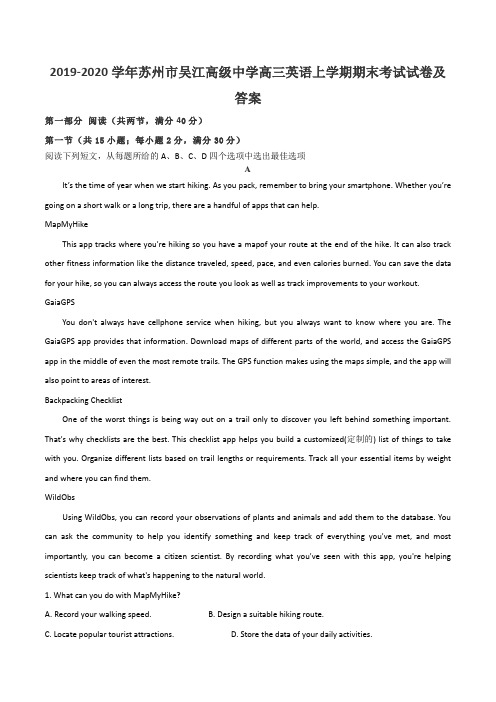
2019-2020学年苏州市吴江高级中学高三英语上学期期末考试试卷及答案第一部分阅读(共两节,满分40分)第一节(共15小题;每小题2分,满分30分)阅读下列短文,从每题所给的A、B、C、D四个选项中选出最佳选项AIt’s the time of year when we start hiking. As you pack, remember to bring your smartphone. Whether you’re going on a short walk or a long trip, there are a handful of apps that can help.MapMyHikeThis app tracks where you're hiking so you have a mapof your route at the end of the hike. It can also track other fitness information like the distance traveled, speed, pace, and even calories burned. You can save the data for your hike, so you can always access the route you look as well as track improvements to your workout. GaiaGPSYou don't always have cellphone service when hiking, but you always want to know where you are. The GaiaGPS app provides that information. Download maps of different parts of the world, and access the GaiaGPS app in the middle of even the most remote trails. The GPS function makes using the maps simple, and the app will also point to areas of interest.Backpacking ChecklistOne of the worst things is being way out on a trail only to discover you left behind something important. That's why checklists are the best. This checklist app helps you build a customized(定制的) list of things to take with you. Organize different lists based on trail lengths or requirements. Track all your essential items by weight and where you can find them.WildObsUsing WildObs, you can record your observations of plants and animals and add them to the database. You can ask the community to help you identify something and keep track of everything you've met, and most importantly, you can become a citizen scientist. By recording what you've seen with this app, you're helping scientists keep track of what's happening to the natural world.1. What can you do with MapMyHike?A. Record your walking speed.B. Design a suitable hiking route.C. Locate popular tourist attractions.D. Store the data of your daily activities.2. What is WildObs intended to do?A. To provide survival skills.B. To lead the way.C. To identify wildlife.D. To help make preparations.3. Which app is most useful before hiking?A. GaiaGPS.B. MapMyHike.C. WildObs.D. Backpacking Checklist.BFor as long as I can remember, my body and I have shared a relationship of discontent. Growing up, I was skinnier than the other kids and at five I was told I wasn't attractive and that I must put on some weight. But no matter how much I ate, I stayed thin for years until adolescence. Then I started putting on weight almost immediately. I remember feeling happy as I began to fill out. However, my joy didn't last long.I was thirteen when I was first called fat. Friends and neighbours would make jokes on my big size. As I entered my late teens, I had completely lost confidence in my body and, subsequently, in myself. Having failed to live up to conventional beauty standards, I was convinced that if I wanted to be loved, I needed to offer more, doing anything to please everyone around.I entered adulthood thinking I wasn't “enough”—an idea that was seeded not only by the fact that “skinny” is celebrated, but also by the language associated with accounts of losing weight—selfimprovement, discipline—all virtues. Being fat quickly categorizes you as lazy and undisciplined. Consumed by thoughts of the way my body looked, I didn't notice the other ways my body needed attention. I failed to realize, for example, that my period was much heavier and more painful than ever before. Actually I developed a rare disease and later I had two surgeries.I was always made to feel that my weight was the root of a lot of problems in my life; I have learnt this is not true. After a lot of selfreflection and some professional help, I realized I never learnt to like myself. While two decades of selfhatred cannot be undone overnight, I have taken first steps to acceptance.I am now much lighter than before, in body and mind. There are days I find voices on social media saying I am too fat to be loved or to be worthy, but I am learning not to focus on that thought for long. As long as I like myself, just the way I am, opinions at the end of the day are just water off a duck's back.4. What can we learn about the author from the first two paragraphs?A. She could change her weight at will.B. She had different beauty standards from others.C. She tried to love others to build her confidence.D. She was greatly influenced by others' opinions.5. Why did the author think she wasn't “enough”?A. She was poorly disciplined.B. She failed to celebrate “skinny”.C. She was labelled as lazy for her weight.D. She put on more weight after entering adulthood.6. What caused the author to make a change?A. Her lighter body.B. A troublesome illness.C. Popular beauty standards.D. Others' critical comments.7. What is the best title for the text?A. Beauty matters.B. Opinions vary.C. Worth your weight.D. Beyond your limits.CMany Americans experience surprise (or disappointment) when they wake up on Christmas Day. They might be surprised or disappointed by a family member’s actions. They might be happy or unhappy about a Christmas gift. Imagine a child expects to get an Xbox or PlayStation for Christmas. On Christmas morning, they quickly open their gift. Inside is an English grammar book. They might feel disappointed. The Everyday Grammar team would prefer the new English grammar book. But if you are like most young people, you would probably rather have a new video game.Today, we are going to explore those feelings-feelings of surprise and disappointment. In other words, we are going to explore how speakers show that reality was better or worse than their expectations.Many languages use words to express expectation. Speakers also use words to express how events are not happening as expected. This idea is known as “counter expectation”.Do not worry about the term. Just remember that it means that speakers use words to show that reality is countering their expectations.English has many words that serve this purpose. Three of the most common are the words “even”, “still” and “actually”. You will often hear them in informal, everyday speech. Speakers use these words to show disappointment. The pitch of their voice tells you what they mean. Let’s study examples of each word.Speakers often use the word "even” to show disappointment or surprise. Imagine a young child that expectsa phone call from a family member-perhaps an uncle or grandparent. The phone call never comes. The child might say the following: “What’s wrong with him? He didn’t even call me on Christmas day.” Americans sometimes use “still” for showing how reality does not quite meet their expectations: “You’re still here? It’s over! Go home. Go!” Another common word that shows surprise or disappointment is “actually”: “I can’t believe it! Uncle Bob actually stole her Christmas gift.”8. What might most young Americans prefer as a Christmas gift according to paragraph 1?A. A newly made video game.B. An English grammar book.C. A new designed school bag.D. A unique jacket from their parents.9. What does the underlined phrase “counter expectation” in paragraph 3 mean?A. Expression of disappointment.B. Something expected to happen.C. The same with one’s expectation.D. A result against what is expected.10. What do the three words “even”, “still” and “actually” have in common?A. They are easy to understand.B. They express disappointment.C. They show delighted feelings.D. They are used most at Christmas.11. What’s the last paragraph mainly about?A. Expectations from loved ones.B. Different uses of the three words.C. Examples of the use of the three words.D. Emotions of disappointment and surprise.DThink ofJapanin the spring and the image that comes to mind is likely the country’s famous cherry blossoms, also known as “Sakura” — white and pink flowers, blooming across cities and mountains.The flowers, which experience a “peak bloom” that only lasts a few days, have been loved inJapanfor more than a thousand years. Crowds celebrate with viewing parties,flockingto the most popular locations to take photos and have picnics underneath the branches.But this year, cherry blossom season has come and gone in the blink of an eye, in one of the earliest blooms on record. Scientists warn it’s a symptom of the larger climate crisis threatening ecosystems everywhere.Yasuyuki Aono, a researcher atOsakaPrefectureUniversity, has gathered records fromKyotoback to 812 AD from historical documents and diaries. In the central city ofKyoto, cherry blossoms peaked on March 26, the earliest in more than 1,200 years, Aono said. And in the capitalTokyo, cherry blossoms reached full bloom on March 22, the second-earliest date on record.The peak bloom dates shift every year, depending on numerous factors including weather and rainfall, buthave shown a general trend of moving earlier and earlier. InKyoto, the peak date stayed around mid-April for centuries, but began moving into early April during the 1800s. The date has only dipped into late March a handful of times in recorded history.“Sakura blooms are very temperature sensitive,” said Aono. “Flowering and full bloom could be earlier or later depending on the temperature alone,” he said. “The temperature was low in the 1820s, but it has risen by about 3.5 degrees Celsius to this day.”This year’s seasons in particular influenced the blossom dates, he added. The winter was very cold, but the spring came fast and unusually warm.12. What is the best title of the passage?A. Cherry blossom celebrations.B. Warning of a climate crisis.C. A strong love for cherry blossom.D. Cherry blossom season coming earlier.13. What does the underlined word “flocking” mean?A. Blocking.B. Flooding.C. Running.D. Following.14. What can we infer from paragraph 5?A. The peak blossom dates fall on a fixed date.B. The cherry blossom rarely peaks in March.C. The peak bloom dates mainly depend on weather and rainfall.D. Cherry blossom peaks around mid-April inTokyo.15. What is the author’s purpose in writing the passage?A. To inform people the date of cherry blossom.B. To show a study on cherry blossom dates.C. To present a Japanese tradition of cherry blossom celebration.D. To make people aware of the influence of climate change on cherry blossom.第二节(共5小题;每小题2分,满分10分)阅读下面短文,从短文后的选项中选出可以填入空白处的最佳选项。
2019-2020学年江苏省苏州中学高三英语上学期期末考试试题及答案

2019-2020学年江苏省苏州中学高三英语上学期期末考试试题及答案第一部分阅读(共两节,满分40分)第一节(共15小题;每小题2分,满分30分)阅读下列短文,从每题所给的A、B、C、D四个选项中选出最佳选项ASheffieldLincoln College of EnglishClasses for foreign students at all levels.3 months, 6 months, 9 months and one year course.Open all year.Small class (at most 12 students).Library, language laboratory and listening center.Accommodation (住宿)with selected families.25 minutes from London.Course fees for English for one year are£1,380 with reduction for shorter periods of study.1.This passage is probably taken from _______.A.an advertisementB.a noticeC.a posterD.a piece of news2.Who will be accepted by this college?A.Both foreign and native students.B.Only foreign beginners and the advanced.C.Foreign students from beginners to the advanced.D.Only foreign students advanced.3.While you stay there, who will take care of you?A.Your parents.B.Your classmates.C.The school where you study.D.The family you have chosen.BYou run into the grocery store to quickly pick up your item. You grab what you need and head to the front of the store. After quickly sizing up the check-out lines, you choose the one that looks fastest. You chose wrong. People getting in other lines long after you have already checked out and headed to the parking lot. Why does thisseem to always happen to you?Well, as it turns out, it's just math that is working against you. A grocery store tries to have enough employees at the checkout lines to get all their customers through with minimum delay. But sometimes, like on a Sunday afternoon, they get super busy. Because most grocery stores don't have the physical space to add more checkout lines, their system becomes overburdened. Some small interruption — a price check, a particularly talkative customer — will have downstream effects, holding up the entire line behind them.If there are three lines at the store, these delays will happen randomly at different registers (收银台). Think about the probability. The chances of your line being that fastest one are only one in three, which means you have a two-thirds chance of not being in the fastest line. So it's not just in your mind: Another line is probably moving faster thanyours.Now, mathematicians have come up with a good solution, which they call queuing theory, to this problem: Just make all customers stand in one long snaking line, called a serpentine line, and serve each person at the front with the next available register. With three registers, this method is about three times faster on average than the more traditional approach. This is what they do at most banks, Trader Joe's, and some fast-food places. With a serpentine line, a long delay at one register won't unfairly punish the people who lined up behind it. Instead, it will slow everyone down a little bit.4. What phenomenon is described in the first paragraph?A. Queuing in a line.B. A shopping experience.C. A rush in the morning.D. Cutting in a line.5. According to the article, what may cause delays in checking out?A. The lack of employees in the grocery store.B. Some unexpected delays of certain customers.C. The increasing items bought by customers.D. A worsening shopping system of the store.6. What is the solution given by mathematicians?A. Employing more workers for checking out.B. Limiting the number of queuing people.C. Making only one line available.D. Always standing in the same line.7. What's the principle behind the queuing theory?A. To pursue the maximum benefit.B. To leave success or failure to luck.C. To avoid the minimum loss.D. To spread the risk equally among everyone.CMany of us were delighted to learn that a high school senior Kwasi Enin was accepted to all eight Ivy League universities. To our surprise, he wasn't excited as expected, but appeared extra calm. He announced that he would revisit the universities to find the best suitable in music or medicine. He also wanted to compare their financial aid packages.Kwasi's success story is rare, but his reaction is not. After the admission letters arrive at home, students have 30 days to really think about what kind of school would help them grow as a person, which school would best prepare them for the future, and at which school they would be happiest. And they also have to think about whether they can afford the school they choose.But how to answer the questions about which school is the best suitable university? Some young people are attracted to large universities with great school spirit and a list of offerings. But besides those advantages, many of these universities focus on graduate work and research, with undergraduates taught mostly by part-time instructors. Others are attracted to smaller boarding schools with discussion-based classes. But some of these schools will have much limitation for students who want a high-energy city life experience.Many students today seem to think they should pick the university where they will get the diploma that will help them get the most highly paid job. This is a sad misunderstanding of what a college education should provide.A good college education should prepare them to overcome any difficulty andthrivein society. It helps them to form the habit of creative mind and spirit that will continue to develop far beyond their university years. So when you choose college, you should consider if it is filled with useful learning to help create new spaces for different possibilities of growth.8. What can we know about Kwasi Enin from paragraph 1?A. He was from a very poor family.B. He would choose the top university.C. He was too excited to calm himself at the good news.D. He considered his interests when choosing his university.9. What can you infer from paragraph 2?A. Few students can be admitted to university.B. Many students face the choices like Kwasi.C. Top universities are the first choice for most students.D. American students can afford their university by themselves.10. Which of the following can best explain the underlined word “thrive” in paragraph 4?A. FailB. SucceedC. ResearchD. Work11. What should the best university be like according to the text?A. Very large and have good instructors.B. Small boarding schools with discussion-based classes.C. It will offerthe diploma to get the most highly paid job.D. It will help continue to develop far beyond university years.DThe far side of the moonis a strange and wild region, quite different from the familiar and mostly smooth face we see nightly from our planet. Soon this rough space will have even stranger features: it will be crowded with radio telescopes.Astronomers are planning to make the moon's distant side our newest and best window on the cosmic(宇宙的) dark ages, a mysterious era hiding early marks of stars and galaxies. Our universe was not always filled with stars. About 380,000 years after the big bang, the universe cooled, and the first atoms of hydrogen formed. Gigantic hydrogen clouds soon filled the universe. But for a few hundred million years, everything remained dark, without stars. Then came the cosmic dawn: the first stars flickered, galaxies came into existence and slowly the universe's largescale structure took shape.The seeds of this structure must have been present in the darkage hydrogen clouds, but the era has been impossible toprobeusing optical(光学的) telescopes—there was no light. And although this hydrogen produced longwavelength(or lowfrequency) radio emissions,radio telescopes on Earth have found it nearly impossible to detect them. Our atmosphere either blocks or disturbs these faint signals; those that get through are drowned out by humanity's radio noise.Scientists have dreamed for decades of studying the cosmic dark ages from the moon's far side. Now multiple space agencies plan lunar missions carrying radiowavedetecting instruments—some within the next three years—and astronomers' dreams are set to become reality.“If I were to design an ideal place to do lowfrequency radio astronomy, I would have to build the moon,”saysastrophysicist Jack Burns of the University of Colorado Boulder. “We are just now finally getting to the place where we're actually going to be putting these telescopes down on the moon in the next few years.”12. What's the purpose of building radio telescopes on the moon?A To research the big bang. B. To discover unknown stars.C. To study the cosmic dark ages.D. To observe the far side of the moon.13. What does the underlined word “probe” in Paragraph 3 possibly mean?A. Explore.B. Evaluate.C. Produce.D. Predict.14. Hydrogen radio emissions can't be detected on Earth because ________.A. there was no light in the dark agesB. they cannot possibly get through our atmosphereC. gigantic hydrogen clouds no longer fill the universeD. radio signals on Earth cause too much interference15. What can we infer from theunderlined sentence in the last paragraph?A. Scientists have to rebuild the moon.B. We will finally get to the moon's distant side.C. The moon is a perfect place to set up radio telescopes.D. A favorable research environment will be found on the moon.第二节(共5小题;每小题2分,满分10分)阅读下面短文,从短文后的选项中选出可以填入空白处的最佳选项。
江苏省苏州市2019届高三上学期期末考试 英语 Word版含答案(含听力)
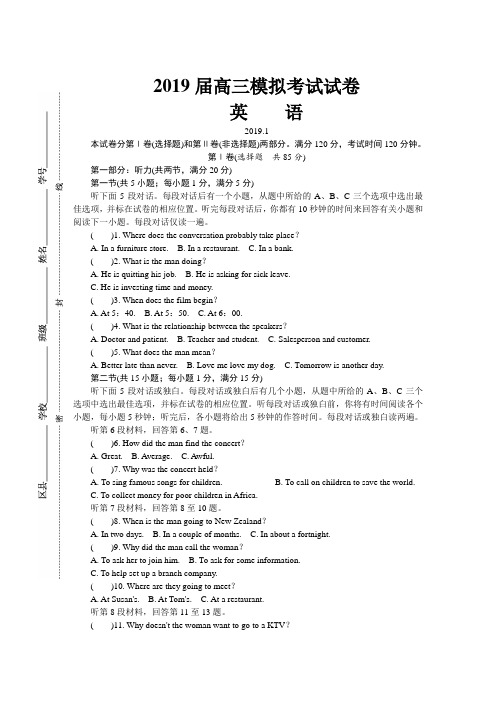
2019届高三模拟考试试卷英语2019.1本试卷分第Ⅰ卷(选择题)和第Ⅱ卷(非选择题)两部分。
满分120分,考试时间120分钟。
第Ⅰ卷(选择题共85分)第一部分:听力(共两节,满分20分)第一节(共5小题;每小题1分,满分5分)听下面5段对话。
每段对话后有一个小题,从题中所给的A、B、C三个选项中选出最佳选项,并标在试卷的相应位置。
听完每段对话后,你都有10秒钟的时间来回答有关小题和阅读下一小题。
每段对话仅读一遍。
()1. Where does the conversation probably take place?A. In a furniture store.B. In a restaurant.C. In a bank.()2. What is the man doing?A. He is quitting his job.B. He is asking for sick leave.C. He is investing time and money.()3. When does the film begin?A. At 5:40.B. At 5:50.C. At 6:00.()4. What is the relationship between the speakers?A. Doctor and patient.B. Teacher and student.C. Salesperson and customer.()5. What does the man mean?A. Better late than never.B. Love me love my dog.C. Tomorrow is another day.第二节(共15小题;每小题1分,满分15分)听下面5段对话或独白。
每段对话或独白后有几个小题,从题中所给的A、B、C三个选项中选出最佳选项,并标在试卷的相应位置。
听每段对话或独白前,你将有时间阅读各个小题,每小题5秒钟;听完后,各小题将给出5秒钟的作答时间。
2019届江苏省苏州市高三上学期期末考试 英语(word版)
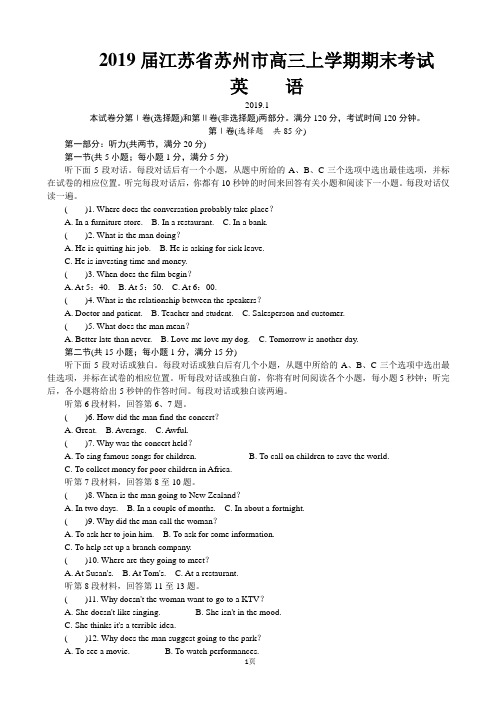
2019届江苏省苏州市高三上学期期末考试英语2019.1本试卷分第Ⅰ卷(选择题)和第Ⅱ卷(非选择题)两部分。
满分120分,考试时间120分钟。
第Ⅰ卷(选择题共85分)第一部分:听力(共两节,满分20分)第一节(共5小题;每小题1分,满分5分)听下面5段对话。
每段对话后有一个小题,从题中所给的A、B、C三个选项中选出最佳选项,并标在试卷的相应位置。
听完每段对话后,你都有10秒钟的时间来回答有关小题和阅读下一小题。
每段对话仅读一遍。
()1. Where does the conversation probably take place?A. In a furniture store.B. In a restaurant.C. In a bank.()2. What is the man doing?A. He is quitting his job.B. He is asking for sick leave.C. He is investing time and money.()3. When does the film begin?A. At 5:40.B. At 5:50.C. At 6:00.()4. What is the relationship between the speakers?A. Doctor and patient.B. Teacher and student.C. Salesperson and customer.()5. What does the man mean?A. Better late than never.B. Love me love my dog.C. Tomorrow is another day.第二节(共15小题;每小题1分,满分15分)听下面5段对话或独白。
每段对话或独白后有几个小题,从题中所给的A、B、C三个选项中选出最佳选项,并标在试卷的相应位置。
江苏省2019-2020学年高三期末考试英语试题含答案
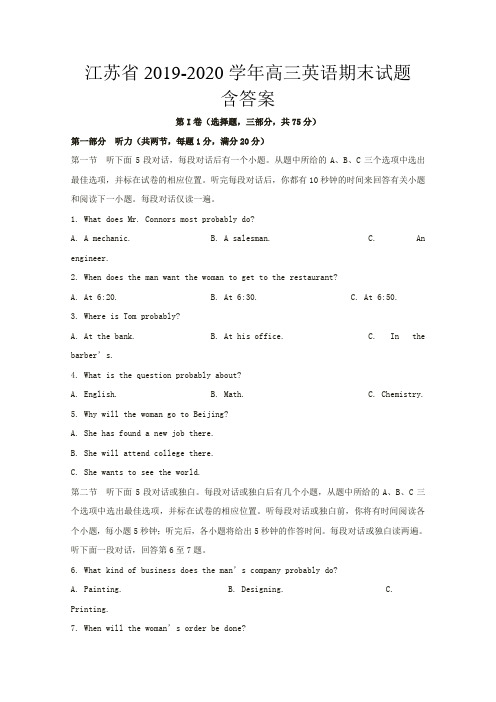
江苏省2019-2020学年高三英语期末试题含答案第I卷(选择题,三部分,共75分)第一部分听力(共两节,每题1分,满分20分)第一节听下面5段对话,每段对话后有一个小题。
从题中所给的A、B、C三个选项中选出最佳选项,并标在试卷的相应位置。
听完每段对话后,你都有10秒钟的时间来回答有关小题和阅读下一小题。
每段对话仅读一遍。
1. What does Mr. Connors most probably do?A. A mechanic.B. A salesman.C. An engineer.2. When does the man want the woman to get to the restaurant?A. At 6:20.B. At 6:30.C. At 6:50.3. Where is Tom probably?A. At the bank.B. At his office.C. In the barber’s.4. What is the question probably about?A. English.B. Math.C. Chemistry.5. Why will the woman go to Beijing?A. She has found a new job there.B. She will attend college there.C. She wants to see the world.第二节听下面5段对话或独白。
每段对话或独白后有几个小题,从题中所给的A、B、C三个选项中选出最佳选项,并标在试卷的相应位置。
听每段对话或独白前,你将有时间阅读各个小题,每小题5秒钟;听完后,各小题将给出5秒钟的作答时间。
每段对话或独白读两遍。
听下面一段对话,回答第6至7题。
6. What kind of business does the man’s company probably do?A. Painting.B. Designing.C. Printing.7. When will the woman’s order be done?A. By the end of the week.B. At the beginning of next month.C. In six weeks.听下面一段对话,回答第8至9题。
- 1、下载文档前请自行甄别文档内容的完整性,平台不提供额外的编辑、内容补充、找答案等附加服务。
- 2、"仅部分预览"的文档,不可在线预览部分如存在完整性等问题,可反馈申请退款(可完整预览的文档不适用该条件!)。
- 3、如文档侵犯您的权益,请联系客服反馈,我们会尽快为您处理(人工客服工作时间:9:00-18:30)。
2019届高三模拟考试试卷英语2019.1本试卷分第Ⅰ卷(选择题)和第Ⅱ卷(非选择题)两部分。
满分120分,考试时间120分钟。
第Ⅰ卷(选择题共85分)第一部分:听力(共两节,满分20分)第一节(共5小题;每小题1分,满分5分)听下面5段对话。
每段对话后有一个小题,从题中所给的A、B、C三个选项中选出最佳选项,并标在试卷的相应位置。
听完每段对话后,你都有10秒钟的时间来回答有关小题和阅读下一小题。
每段对话仅读一遍。
()1. Where does the conversation probably take place?A. In a furniture store.B. In a restaurant.C. In a bank.()2. What is the man doing?A. He is quitting his job.B. He is asking for sick leave.C. He is investing time and money.()3. When does the film begin?A. At 5:40.B. At 5:50.C. At 6:00.()4. What is the relationship between the speakers?A. Doctor and patient.B. Teacher and student.C. Salesperson and customer.()5. What does the man mean?A. Better late than never.B. Love me love my dog.C. Tomorrow is another day.第二节(共15小题;每小题1分,满分15分)听下面5段对话或独白。
每段对话或独白后有几个小题,从题中所给的A、B、C三个选项中选出最佳选项,并标在试卷的相应位置。
听每段对话或独白前,你将有时间阅读各个小题,每小题5秒钟;听完后,各小题将给出5秒钟的作答时间。
每段对话或独白读两遍。
听第6段材料,回答第6、7题。
()6. How did the man find the concert?A. Great.B. Average.C. Awful.()7. Why was the concert held?A. To sing famous songs for children.B. To call on children to save the world.C. To collect money for poor children in Africa.听第7段材料,回答第8至10题。
()8. When is the man going to New Zealand?A. In two days.B. In a couple of months.C. In about a fortnight.()9. Why did the man call the woman?A. To ask her to join him.B. To ask for some information.C. To help set up a branch company.()10. Where are they going to meet?A. At Susan's.B. At Tom's.C. At a restaurant.听第8段材料,回答第11至13题。
()11. Why doesn't the woman want to go to a KTV?A. She doesn't like singing.B. She isn't in the mood.C. She thinks it's a terrible idea.()12. Why does the man suggest going to the park?A. To see a movie.B. To watch performances.C. To listen to the woman's grandma singing.()13. What does the woman want to do tonight?A. Go shopping.B. Go dancing.C. Go swimming.听第9段材料,回答第14至16题。
()14. What is the man most worried about?A. He'll be forgotten by people.B. His stories won't be published.C. The woman will get mad.()15. What does the woman think of the man?A. Selfish.B. Special.C. Optimistic.()16. What are they mainly talking about?A. The meaning of life.B. The cure for disease.C. The story of love.听第10段材料,回答第17至20题。
()17. What belief did Maria's father fill her with?A. Honesty.B. Selfconfidence.C. Diligence.()18. What did Maria do upon graduation?A. She went into politics.B. She worked as a teacher.C. She opened a coffee bar.()19. Where did Maria set up her first coffee bar?A. In London.B. In Singapore.C. In New York.()20. How many coffee bars will she probably have in all?A. 80.B. 85.C. 165.第二部分:英语基础知识运用(共两节,满分35分)第一节:单项填空(共15小题;每小题1分,满分15分)请认真阅读下面各题,从题中所给的A、B、C、D四个选项中,选出最佳选项。
()21. On Mondays,our national flag,each student in our school stands to attention,eyes focused on the rising flag.A. in preparation forB. in salute toC. in recognition ofD. in correspondence with()22. The vase was quite so we had to wrap it in soft material before we send it by post.A. fragileB. flexibleC. fragrantD. false()23. There are lots of examples of English idioms animals are used.A. whichB. whereC. whenD. that()24. Home-sharing in rural areas has huge growth as more and more Chinese tourists are travelling to villages for unique rural experiences.A. survivalB. potentialC. intervalD. approval()25. —We are looking for somebody who is fluent in Spanish.—No problem. I Spanish for four years at college.A. have studiedB. studiedC. had been studyingD. was studying()26. TheGrapesofWrath is a wellknown novel about a family of farmers who flee to California for they hope will be a better life.A. howB. whereC. whichD. what()27. the food,the foreign guests did enjoy the dinner for the Spring Festival.A. Eat upB. Eaten upC. To eat upD. Having eaten up()28. As more and more jobs are by AI,people will have more leisure time.A. taken onB. brought inC. held upD. wiped away()29. The year 2018 is a special one in that it the 40th anniversary of the launch of China's reform and opening-up policy.A. signalsB. advocatesC. anticipatesD. marks()30. Had I gone white-water rafting with my friends,I down the Colorado River right now.A. are floatingB. will floatC. would be floatingD. would have floated()31. Never weep even when you are sad you never know who is falling in love with your smile.A. as ifB. asC. as long asD. as far as()32. —The power is off,Mom. I am going to Grandpa's.—Ok,just stay there until the power W.A. will be restoredB. is restoredC. will restoreD. has restored()33. I have known Tom Jones for years;naturally,he is nervous in case anything go wrong.A. shouldB. canC. mustD. will()34. I was when I got what I badly wanted for my birthday.A. tickled pinkB. green with envyC. caught redhandedD. whiter than white()35. —The steak sounds good,but it's hard to resist the fried chicken.—W. I'll have the sea food.A. Can't agree moreB. Easy does itC. You don't sayD. Suit yourself第二节:完形填空(共20小题;每小题1分,满分20分)请认真阅读下面短文,从短文后各题所给的A、B、C、D四个选项中,选出最佳选项。
